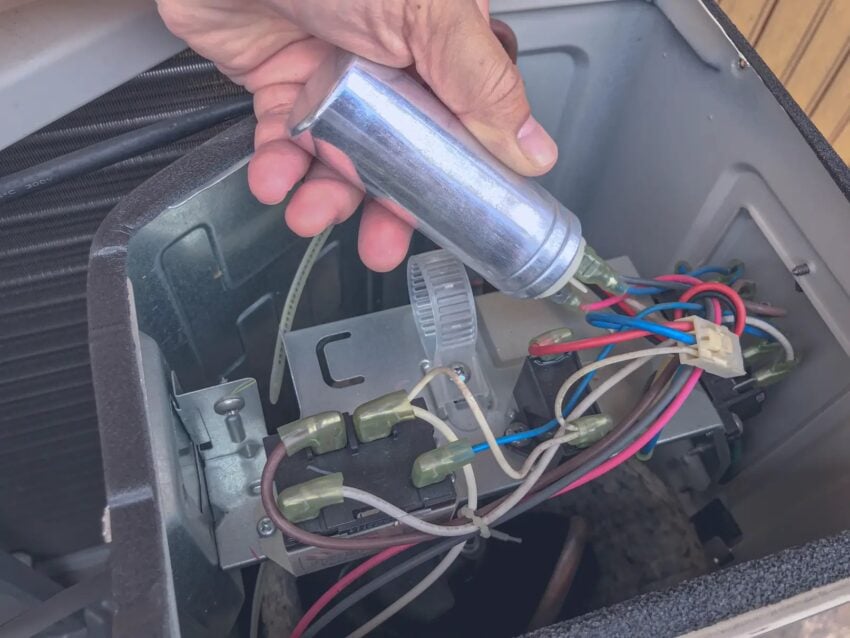The average cost to replace an AC capacitor is $180, including parts and labor for installation. The cost depends on several variables but is typically between $120 to $400. We’re going over what an AC capacitor does and the factors that influence the cost of replacing one.
Capacitors are widely used in electronics and found in everything from water pumps to refrigerators and washing machines. In your AC unit, the capacitor is a crucial component, and while it doesn’t do anything but help other components work, your air conditioner won’t operate without it.
Compared to other AC components, replacing a capacitor is relatively inexpensive. To illustrate, here are some other typical AC component replacement costs.
- Refrigerant recharge- $100 to $900
- Circuit board replacement- $150 to $650
- Evaporator coil replacement- $600 to $1,300
- Condensing unit fan motor replacement- $100 to $700
Factors in Calculating AC Capacitor Cost

Several factors influence the cost of an AC capacitor, including the size, voltage rating, and brand. Other factors, such as market demand and availability, can also determine the price you have to pay for a new capacitor.
Capacitor Size and Voltage Rating
Capacitors for AC units come in several different sizes and voltage ratings. Generally, larger capacitors and those with higher voltages cost significantly more to replace.
Capacitor Size
HVAC systems with more cooling capacity have larger AC capacitors. Capacitors are typically sized by how much charge they can hold, labeled in microfarad units (µF). Large HVAC systems require capacitors rated from 40 to 80 µF, while small HVAC systems only require a capacitance of 5 to 15 µF.
Capacitor Voltage Rating
HVAC systems typically use capacitors with a voltage rating of 370 to 440 volts, with capacitor ranges of 125V, 250V, and 330V. The higher the voltage rating, the more the air conditioner capacitor costs, typically from $20 to $95.
Brand and Manufacturer
Most HVAC technicians don’t use the same brand and manufacturer as your unit when replacing capacitors. However, the quality of capacitors from some manufacturers is better than others and can be a significant price determiner.
If you’re operating your AC unit under harsh conditions, quality will be more important and the cost of using a top-name brand is worth it, considering it usually only raises the cost $15 to $140.
Availability and Market Demand
Rising demand and shortages of electrical components contribute to higher costs. The costs of many different types of electrical components are affected, just like the well-known global chip shortages increased the cost of semiconductor chips.
Market demand for AC components is higher during the hottest parts of the year, so replacing them during the off-season can help lower your costs.
Additional Costs and Considerations

Here are additional factors to consider when calculating AC unit capacitor costs.
Labor and Service Charges
Most of the cost of replacing an AC capacitor is labor. The more accessible your HVAC unit is, the less you’ll have to pay for service charges.
An experienced HVAC technician can install a new AC capacitor in less than 30 minutes if it’s easy to get to, and it could cost you as little as $30 to $60 in labor, depending on your location. More commonly, the labor cost to replace an AC capacitor is in the $120 to $250 range.
Diagnostic Fees
HVAC technicians may add an additional diagnostic fee to their service call. The average HVAC diagnostic fee is $150 to $200, so if you don’t want to pay this, it’s best to ask them about this charge when you schedule service.
Emergency or Off-Hours Replacement Charges
Off-hours and emergency replacement costs are typically much higher than scheduled repairs. On the high end, emergency service calls could cost as much as $400 to $600 per hour.
Types of AC Capacitors

There are several AC capacitor types, and your air conditioner may have a few different ones. Generally, the cost of AC capacitors is relatively inexpensive, and most of the costs of replacing them come from labor costs.
Start Capacitors
The purpose of a start capacitor is to store energy to assist a motor or compressor to start. If they fail, the motor may not start. A failed start capacitor could also cause the unit to overheat or vibrate.
Description and Typical Uses
Once the start capacitor’s job of starting the AC motor has been accomplished, it turns off, and the run capacitor steps in.
Start capacitors typically cost $9 to $25. The average cost to replace start capacitors is $110 to $325.
Run Capacitors
The run capacitor on an AC unit is often simply called an AC capacitor. The start and run capacitors store energy and provide it to the AC circuit board when needed.
Just like with a start capacitor, a failed run capacitor can lead to the AC unit not starting, and it can also cause it to overheat and vibrate. Although they perform similar functions, start and run capacitors are not interchangeable.
Run capacitors typically cost $8 to $30, and the average cost to replace them is $70 to $110.
Dual Run Capacitors
Dual-run capacitors are standard in many HVAC systems, usually to assist compressors and condenser fans. You can usually tell when a dual-run capacitor needs to be replaced because it will start making loud noises and buzzing sounds. It may also show signs of visible damage.
Dual-run capacitors typically cost $15 to $45, and the average cost to replace dual-run capacitors is $160 to $375.
Signs You Need to Replace Your AC Capacitor

How do you know if you need a new AC capacitor? A faulty capacitor can lead to your AC not starting, noticeable humming sounds, and your system shutting off on its own. You may also notice visible signs of damage on your AC capacitor.
AC Not Starting or Struggling to Start
If your AC unit isn’t starting or is struggling to start, that’s a sure sign of a bad capacitor. These problems can also lead to an increase in your electric bill, as your AC unit will have to work harder to stay going.
Noticeable Humming Sounds
Can you hear a noticeable humming sound coming from your AC unit? AC units typically make noises, including occasional hisses and light humming sounds, but hearing a new type of humming noise could be a faulty capacitor.
AC System Shuts Off on Its Own
Your AC unit shutting off on its own is a sign of some kind of electrical problem, and faulty capacitors are one of the leading causes. You should also consider a bad connection, broken thermostat, or faulty circuit board.
Visible Damage to the Capacitor
What does a damaged capacitor look like? Usually, you’ll notice a bulged or swollen top, and if it’s really bad, it may even leak electrolytes. Noticeable signs of leakage can look like brown rust or coffee stains leaking out of the capacitor.
DIY AC Capacitor Replacement vs. Hiring a Professional

Many DIYers feel confident in tackling the job of AC capacitor replacement, but it’s critical to understand the safety risks involved. Consider the following pros and cons of DIY AC capacitor replacement versus hiring a professional repair technician.
Safety First: Risks Involved in DIY
There are serious safety concerns with DIY AC capacitor replacement. Capacitors store high-voltage energy. If they aren’t correctly discharged before handling, they can cause electrocution.
Necessary Tools and Skills
In addition to taking the necessary safety precautions, you’ll need the right tools and skills for DIY AC capacitor replacement.
In most cases, you only need a new capacitor, an insulated screwdriver, and a nut driver. Be sure to wear safety gloves and goggles, turn off the power supply before you start, and discharge the capacitor.
Warranty Considerations: Invalidating Guarantees
Most HVAC systems with central AC units are under warranty for several years, and you can void the warranty by making improper repairs. It’s not worth voiding a warranty on equipment that costs several thousands of dollars on a repair that costs less than a few hundred dollars.
Advantages of Expert Diagnostics and Replacement
HVAC technicians can provide expert diagnostics for your AC unit and tell you immediately if there are other problems with your system. If you have a faulty capacitor that needs to be replaced, you can combine the service with regularly scheduled maintenance and save a little money on a service call.
How to Save Money on AC Capacitor Replacement Cost
Use these money-saving tips to lower the cost of AC capacitor replacement.
Bulk Purchases for Property Managers
If you’re a property or facility manager maintaining a property with several AC units of the same type, buying in bulk is one of the smartest ways to save.
Shopping Off-Season or During Promotions
When you have owned an AC unit for more than ten years, the chances of needing to replace a capacitor are very high. Buy them during promotional or off-season periods and keep a spare for when it eventually goes out.
Regular Maintenance to Catch Issues Early
Properly maintained equipment is less likely to have problems, but one of the best ways to avoid replacing an AC capacitor is to install an HVAC surge protector. Another way to ensure the longevity of your AC capacitor is to use a dehumidifier in your utility room.
Investing in Quality to Reduce Frequency of Replacements
Even if you don’t replace the AC capacitor yourself, you can purchase a quality capacitor and avoid future replacements. It’s also an excellent way to avoid paying extra for the AC capacitor since many professionals have a markup on the cost of parts.
Making Informed Decisions on Replacement and Costs
Understanding the average replacement costs of AC capacitors is helpful when you’re presented with an HVAC technician’s repair bill or quote. It’s also nice to know what to expect when deciding whether it’s worth it to DIY the repair or call a professional to do it for you.
Frequently Asked Questions About AC Capacitor Replacement
How long does an AC capacitor typically last?
Capacitors can last anywhere from 5 to 20 years, depending on various factors. High humidity causes capacitors to rust and can reduce their lifespans. If your AC unit is over ten years old, it will likely need a new capacitor within five to ten years.
Can a bad AC capacitor lead to other system issues?
A faulty capacitor can lead to several issues with your AC unit, including overheating and improper voltage delivery, which can make your AC unit work harder and cause it to fail prematurely.
How quickly can I get an AC capacitor replaced?
AC capacitor replacement can usually be done in under two hours, as it’s a relatively simple maintenance task. However, complex installations can take several hours, so it’s best to call your HVAC technician when you suspect a faulty capacitor.
Does the type of my AC system affect the capacitor type and cost?
Most AC units have similar AC capacitor replacement costs, but if your HVAC system uses heat pump technology, it will cost more, as heat pump capacitors are more expensive.
Is it safe to handle an AC capacitor without professional help?
AC capacitors are dangerous because they are high-voltage devices, and touching one without discharging it can result in severe injury or death. If you don’t know what you’re doing, it’s best to call a repair technician.



